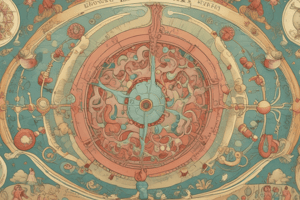Podcast
Questions and Answers
What is the primary function of releasing hormones produced by the hypothalamus?
What is the primary function of releasing hormones produced by the hypothalamus?
- Stimulate the secretion of pituitary hormones (correct)
- Regulate the metabolism of thyroid hormones
- Transport hormones to the bloodstream
- Inhibit the secretion of pituitary hormones
Which hormone is secreted by the anterior pituitary and plays a role in mammary gland function?
Which hormone is secreted by the anterior pituitary and plays a role in mammary gland function?
- Growth hormone (GH)
- Thyroid-stimulating hormone (TSH)
- Prolactin (PRL) (correct)
- Melanocyte-stimulating hormone (MSH)
What defines the characteristics of hormones within the endocrine system?
What defines the characteristics of hormones within the endocrine system?
- Non-nutrient chemicals that act as intercellular messengers (correct)
- Only affects the glands that produce them
- Requires ducts for transport to target tissues
- Produced in large amounts and acts on all tissues
What condition results from the overproduction of growth hormone (GH)?
What condition results from the overproduction of growth hormone (GH)?
Which part of the pituitary gland is primarily responsible for regulating various body functions through its hormones?
Which part of the pituitary gland is primarily responsible for regulating various body functions through its hormones?
Flashcards are hidden until you start studying
Study Notes
Endocrine System Overview
- Invertebrates possess a simple endocrine system with a limited number of hormones.
- Vertebrates feature a complex endocrine system, characterized by a wide variety of hormones.
Endocrine Glands
- Endocrine glands are ductless and secrete hormones directly into the extracellular fluid (ECF).
- Hormones are non-nutrient chemicals acting as intercellular messengers, produced in trace amounts.
- Hormones are transported via blood and exert effects on specific target tissues only.
Hypothalamus
- The hypothalamus is located in the basal part of the diencephalon in the forebrain.
- It contains several nuclei made up of neurosecretory cells that produce hypothalamic hormones.
- Regulates the synthesis and secretion of pituitary hormones through:
- Releasing hormones (RH): Stimulate pituitary hormone secretion (e.g., Gonadotropin-releasing hormone (GnRH)).
- Inhibitory hormones (IH): Inhibit pituitary hormone secretion.
Pituitary Gland
- Situated in the sella turcica, a bony cavity, and attached to the hypothalamus via the infundibulum.
- Connected to the hypothalamus through a portal system.
- Pars distalis (anterior pituitary) is crucial for hormone production, with the pars intermedia often merged with it in humans.
- Produces adenohypophysis hormones like somatostatin.
- Regulates a wide range of body functions, including:
- Growth Hormone (GH): Promotes overall body growth.
- Prolactin (PRL): Targets mammary glands to stimulate milk growth and formation.
- Thyroid Stimulating Hormone (TSH): Stimulates the thyroid gland to secrete thyroid hormones.
- Melanocyte Stimulating Hormone (MSH): Regulates skin pigmentation by acting on melanocytes.
- Gonadotrophins: Influence the function of gonads.
Disorders Related to Endocrine Function
- Acromegaly: A condition resulting from the overproduction of growth hormone (GH).
Studying That Suits You
Use AI to generate personalized quizzes and flashcards to suit your learning preferences.




